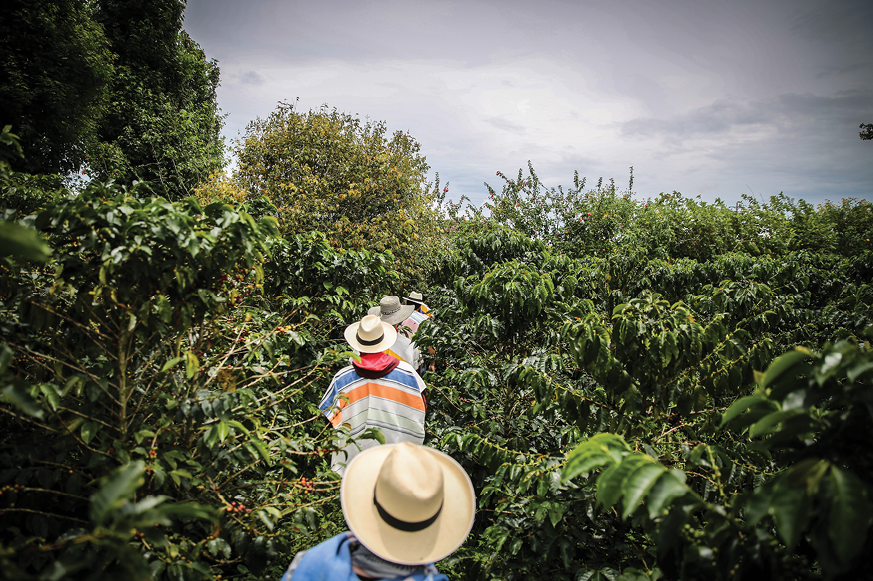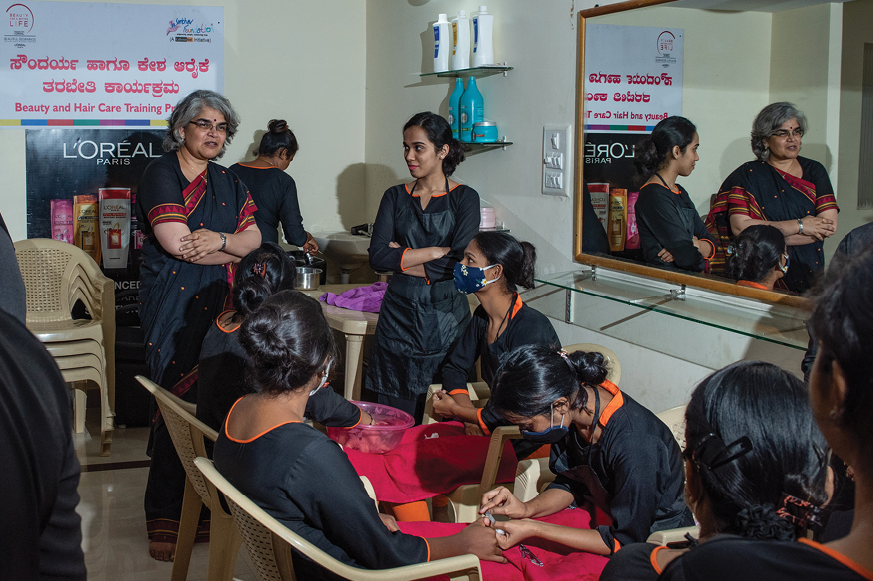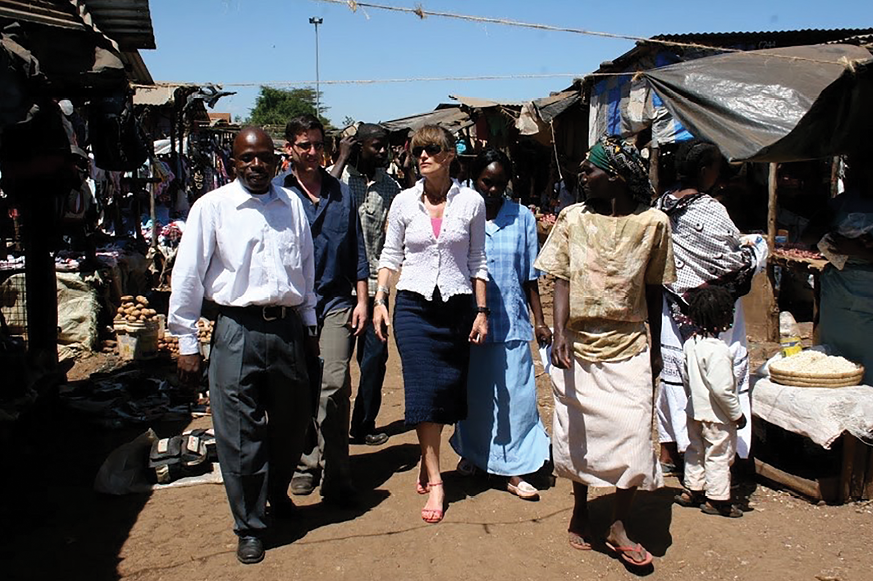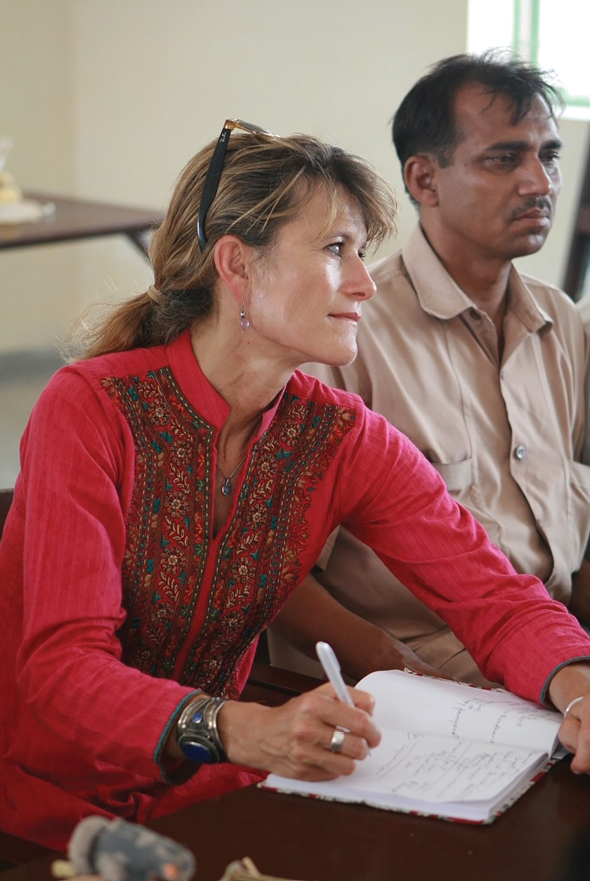- Home
- Media Kit
- Current Issue
- Past Issues
- Ad Specs-Submission
- Ad Print Settings
- Reprints (PDF)
- Photo Specifications (PDF)
- Contact Us

![]()
ONLINE

Building a World Based on Dignity
Editors’ Note
Jacqueline Novogratz quit her job on Wall Street in 1986 to co-found Rwanda’s first microfinance institution, Duterimbere. The experience inspired her to write the bestseller, The Blue Sweater: Bridging the Gap between Rich and Poor, and to create Acumen. Prior to Acumen, she founded and directed The Philanthropy Workshop and The Next Generation Leadership programs at the Rockefeller Foundation. Novogratz serves on board of the Aspen Institute and sits on the Advisory Councils of the Harvard Business School Social Enterprise Initiative, the Oxford Saïd Global Leadership Council and UNICEF. She is a frequent speaker at forums including TED and the Aspen Ideas Festival. In 2017, Forbes listed Novogratz as one of the World’s 100 Greatest Living Business Minds. She holds a BA in economics/international relations from the University of Virginia and an MBA from Stanford.
Organization Brief
Founded in 2001, for 20 years Acumen (acumen.org) has invested in entrepreneurs solving the toughest challenges of poverty by using philanthropy to create impact for the poor. Acumen invests patient, philanthropy-backed capital into entrepreneurs whose companies bring innovations in off-grid energy, inclusive agriculture, decent work and critical services. To date, Acumen has invested $137 million of patient capital in 139 companies that together have transformed the lives of 309 million people. Acumen also raises larger pools of capital to scale their most promising ventures and they currently manage three returnable funds through Acumen Capital Partners. One is focused on scaling solutions in off- grid energy in East Africa, the second on innovations in agribusiness, education and clean energy in Colombia and Peru, and the third on climate resilience for smallholder farmers in West and East Africa. In addition, Acumen is committed to spreading its ethos, principles and practices to equip the next generation of leaders to make change through Acumen Academy, the world’s school for social change. The Academy includes its nine Fellowship programs, online courses and social impact accelerators, which together make up a global community of thousands of leaders and hundreds of thousands of course-takers. Through this approach Acumen believes they can eradicate systemic issues of poverty and impact millions of low-income people around the world. Acumen has been named one of Fast Company’s Top 10 Most Innovative Not-for-Profit Companies.
How do you define Acumen’s mission and purpose?
When I began doing this work over three decades ago, I believed that the opposite of poverty was wealth, but I’ve come to learn through my experience that the opposite of poverty is not wealth, the opposite of poverty is dignity. The dignity of work, the agency to make your own choices, and the opportunity to create a better life. Acumen’s mission is to change the way the world tackles poverty and build that world based on dignity.
“When I began doing this work over three decades
ago, I believed that the opposite of poverty was
wealth, but I’ve come to learn through my
experience that the opposite of poverty is not wealth, the opposite of poverty is dignity. The dignity of work, the agency to make your own choices, and the opportunity to create a better life.”
To achieve our mission, we do three things. First, we invest patient capital – or long-term philanthropy-backed equity or debt – in entrepreneurs seeking to build businesses that are solving tough problems like access to healthcare, education, agriculture and energy access. Why patient capital? Because these entrepreneurs focus on customers who live on just a few dollars a day. Because they must fight bureaucracy and corruption. Because they are building markets that haven’t before existed for the poor. Any financial returns gained by Acumen are reinvested in innovation for the poor.
Second, we identify, link, support and celebrate moral entrepreneurial leaders who are earlier in their journeys to make change. Acumen Academy, the world’s school for social change, has reached hundreds of thousands of individuals online, offering a suite of courses, experiences and business accelerators for people who want to make change, whether at the local or global level. Fellows programs also exist across nine (soon to be eleven) regions: each program annually selects around 20 fellows across race, religion, ethnicity and class, providing skills and tools to build the character and competence needed for effective leadership, especially with regard to building new solutions for the new economy.
Third, we share ideas and spread ethos not only through telling stories and through the work of the Academy, but in the way we measure what matters rather than simply what we can count. After creating and growing “lean data” to capture customer-centric information about the low-income people our companies serve, Acumen spun out this program into a separate company called 60 Decibels.

Shareholder farmers harvesting coffee beans to sell
to Acumen investee Azahar Coffee in Colombia
Will you provide an overview of Acumen’s investments and the impact of its work?
Acumen began in 2001 with the idea of investing philanthropic patient capital in entrepreneurs seeking to solve our world’s most pressing problems. Twenty years on, we have since invested more than $130 million in about 130 companies that have delivered critical services like electricity, agriculture, education and healthcare to more than 300 million very low-income people. As these early-stage companies grow, they often require much larger – and sometimes, more traditional – forms of investment. Acumen currently manages three for-profit impact funds to complement and strengthen the work of patient capital investing.
How has Acumen adapted the way it works to address the challenges caused by the global pandemic?
After a year of challenges in 2020, I now hear in each of my conversations – from New York to Karachi to Lagos to Bogota – how people are moving from a sense of despair to finding purpose and determination through their actions. I saw this profoundly in our work at Acumen throughout the pandemic. Within weeks of the first COVID-19 lockdowns around the world, Acumen’s Board and Partners stepped up to create two emergency funding facilities of over $6 million to support our community of Fellows and entrepreneurs. We previously had not made grants to our companies and fellows, but 2020 was a year in which everything was born anew.

Acumen investee and Labournet founder Gayathri Vasudevan
meets with women participating in their vocational
training programs in India
The emergency facilities enabled Acumen to pivot and rapidly deploy small grants and concessionary debt to companies that, in turn, allowed those companies both to meet urgent, critical needs while adapting themselves operationally to the new economic realities. For instance, in Pakistan, fellow-led enterprise Sehat Kahani’s telemedicine business model provided healthcare to 350,000 with the support of 5,000 voluntary doctors. In India, investee LabourNet repurposed its 100 trainers to distribute food and sanitation products to more than 15,000 migrant workers who were stranded during lockdown, often thousands of miles from their home villages. Additionally, in off-grid energy, Acumen continues to work with a group of 15 funders, including the Green Climate Fund, to launch a target $80 million facility to provide emergency loans to energy access companies that account for more than 370,000 jobs.
Will you discuss the critical need to address climate change and the effect of climate on the poor?
I’ve spent the past 20 years backing entrepreneurs by investing long-term patient capital to solve problems of poverty. Increasingly, this is impossible to do without integrating the realities of the climate crisis. We know the poor are disproportionately impacted by climate change. Farmers lose their livelihoods from droughts or floods or locusts. Millions are displaced, yet they cannot carry their only valuable asset – their land – on their backs. Poverty accelerates, instability rises, and all of us lose.
The question that keeps me up at night, therefore, is how do we enable economic development in ways that allow people to mitigate the worst effects and adapt to the realities of a rapidly changing climate? And what are the investment opportunities that this moment offers? At Acumen, we are committed to addressing challenges at the nexus of poverty and climate. By bringing more than 100 million people affordable, accessible off-grid solar light and electricity, our work is enabling communities to thrive and solve their own problems. In other words, this work fights energy poverty in ways that help avert a long-term climate crisis. Smallholder farmers represent 50 percent of all people living in poverty. Our work supports companies that enable farmers to adapt and become more resilient to the ravages of climate.

Jacqueline Novogratz in Toi Market, Nairobi
What do you see as the role of business in being a tool to solve poverty?
In our interdependent world, business will be judged based on how it serves society. The good news is that business has a powerful role to play not only in creating positive impact, but in solving tough problems of poverty – as a tool for peace in conflict zones, as a means to enable dignity and promote human flourishing. But that vision requires a rejection of business as usual – or business created with the sole purpose of maximizing wealth for shareholders.
Here again, there is good news: many entrepreneurs across the globe recognize the need to reimagine capitalism and a new generation is building a new set of blueprints for how to move from reimagination to practical action. For example, Tyler Youngblood founded Azahar Coffee to deliver some of the world’s best coffee in ways that prioritize the welfare and wellbeing of smallholder farmers. From the start, Azahar designed operations with the farmer at the center. The company starts by understanding what it costs farmers to produce the coffee beans. From there, Azahar makes clear what a “sustainable price” would be for coffee buyers who would roast and then sell the beans. In some cases, large coffee buyers agree to pay 3-4 times what they would have previously on the open market. In return, the farmers supply the highest-quality premium coffee. This is what businesses using and building markets to solve poverty looks like.
What are the keys to addressing health disparities around the world?
A key principle to addressing the disparities of all of our systems is to start by designing with the poor and vulnerable first, not as an afterthought. This single principle alone would change a lot. Our most successful investments ask what problems they are solving and then go from there. In the U.S., for instance, our team has determined that Acumen can best contribute to the healthcare debate by focusing on the social determinants of health. In other words, rather than take on directly our broken health insurance systems, we invest in entrepreneurs focused on those social and environmental factors that contribute to poor health. Healthify works with community-based organizations to ensure that social support systems exist for low-income residents. Consejo Sano ensures that Spanish speaking patients have easy access to translators given that only 4 percent of American doctors speak Spanish. Every Table, an affordable, nutritious fast food restaurant chain, is driven to solve the problem of America’s food deserts. In other words, addressing health disparities requires clarity around specific problems to be solved. The right kind of capital and community should follow.

Jacqueline Novogratz with customers of AMC,
an affordable housing company in Lahore, Pakistan
Do you feel it is a responsibility of leading companies to be a force for good in society and to focus on both profits and purpose?
Whether or not companies have caught up with them, the next generation of consumers is different than those that came before it. This new generation is more concerned with how they live, what they buy and where they work. Not only do they refuse to spend their money on companies who don’t commit to sustainability or responsible supply chains, they also won’t work for them. This is forcing a significant shift in the way businesses work, and a societal change. This generation recognizes that our current institutions have run their course and are seeking to reimagine how we might replace them.
The current generation also understands that the purpose of business can no longer be simply to make a profit – the purpose of business must be to solve our world’s most pressing problems. A shift from shareholder capitalism with profit at the center, to stakeholder capitalism, changes our definition of success to one that puts our shared humanity and the sustainability of the earth at the center of our systems.
What was your vision for writing the book, Manifesto for a Moral Revolution, and what are the key messages of the book?
I began writing this book because I could see that many of our institutions had run their course, however we had not yet reimagined with what to replace them. This is a book for builders, people who recognize broken systems and want to do something about them, want to build solutions, whether in their school or local community, or to solve tough problems like hunger or homelessness or poverty. The book puts forth 13 practices of moral leadership to create frameworks for anyone interested in making change. These practices are not conceptual: they are derived from my experiences working with over a thousand change agents across the world. They reflect what it really takes to make change with a gritty honesty about the pitfalls and failures that are part of a journey of change. Yet it ultimately is a very hopeful book. For just as I have seen the challenges faced by billions across the globe, so too have I seen that wholesale change is possible, not in small ways but in ways the enable human flourishing. Ultimately, this book is a love letter to all those who hope to build a world in which we can move from being consumers to citizens, from being divided to finding ourselves in one another – to reimagine and rebuild a world in which all of us matter.![]()